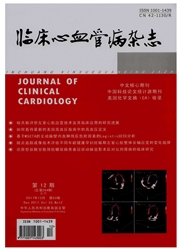

 中文摘要:
中文摘要:
目的:探讨不同类型急性冠脉综合征(ACS)的近期预后差异,提炼影响患者预后的核心因素。方法:收录具备完备诊治及住院存活或死亡信息的ACS患者233例,根据冠状动脉(冠脉)病变程度、心肌缺血/梗死范围、心脏泵功能细分ACS为7种具体类型,分析不同类型患者的住院治疗效果。结果:所有ACS的平均住院存活率为84.1%。其中急性大面积心梗伴泵功能衰竭或心电不稳定患者的住院存活率为21.4%,弥漫多支或左主干病变ACS并泵功能衰竭患者住院存活率为50.0%,其近期预后显著差于ACS的一般存活率。急性大面积心梗存活率为71.4%,差于ACS的平均存活率。非弥漫冠脉病变中小面积急性心肌梗死的住院存活率为95.5%,弥漫性缺血ACS伴小范围急性心肌受损住院存活率96.9%,非弥漫病变不稳定型心绞痛患者的住院存活率为100%,均优于ACS的一般住院存活率。说明心脏泵功能是决定患者近期预后的最关键因素,冠脉病变和心肌受损范围是另两项重要决定因素。结论:不同类型的ACS预后差异巨大,根据冠脉病变、心肌受损范围及心脏泵功能进行分型分析可更精确地评估患者的住院存活率及近期预后。
 英文摘要:
英文摘要:
Objective:To explore the core prognostic factors which influence the short-term prognosis from the observation on the difference of hospitalization survival rate in different acute coronary syndrome(ACS)types.Method:We observed 233 patients with ACS,subdivided into seven specific types according to the degree of coronary artery lesions,myocardial ischemia/infarction,cardiac pump function.We analyzed the hospitalization survival rate in the seven specific ACS types.Result:The average hospitalization survival rate was 84.1%in the patients with ACS.The hospital survival rate in the type of massive acute myocardial infarction with cardiac pump failure or cardiac electrical instability was 21.4%,and the hospital survival rate the type of acute coronary syndrome with diffuse multi-vessel or left main coronary artery lesions and cardiac pump failure hospitalization was50.0%;the survival rate of these two types were significantly worse than the average hospitalization survival rate.The survival rate of acute massive myocardial infarction type was 71.4%,worse than the general survival rate of ACS too.The hospital survival rate in the moderate and small acute myocardial infarction without diffuse coronary artery lesions type was 95.5%,diffuse ischemic acute coronary syndrome with small acute myocardial damage type was 96.9%,and the unstable angina without diffuse coronary lesions was 100%;these three types were superior to general ACS survival.The data showed the cardiac pump function was the most important determinant prognostic factor influenced the short-term prognosis,and second and third factors were coronary artery lesions and myocardial damage area.Conclusion:The prognosis varies widely in different types of ACS.The subtype analysis based on the coronary artery lesions,myocardial damage area and cardiac pump function can predict the hospitalization survival rate and can more accurately assess the short-term prognosis in the patients with ACS.
 同期刊论文项目
同期刊论文项目
 同项目期刊论文
同项目期刊论文
 期刊信息
期刊信息
